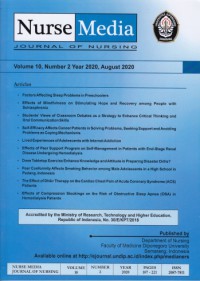
Jurnal
Effects of Mindfulness on Stimulating Hope and Recovery among People with Schizophrenia
Background: Hope has an essential role in the recovery journey for people with schizophrenia. Current studies showed that people with schizophrenia reported having low hope. There is growing evidence that mindfulness has favorable effects on mental health in populations with chronic illness, including people with schizophrenia. However, the studies evaluating effects of mindfulness on hope and recovery for people with schizophrenia are limited.
Purpose: This study aimed to examine the effects of mindfulness on hope and recovery among people with schizophrenia.
Methods: This quasi-experimental study was carried out on 54 patients with schizophrenia based on purposive sampling in a psychiatric hospital in Indonesia. The respondents were divided into two groups with 27 patients each in the intervention and the control group. The intervention group received 2-session mindfulness, while the control group received standard care. The data were collected using the demographic questionnaire, the Schizophrenia Hope Scale (SHS-9), and Recovery Assessment Scale (RAS), and analyzed using the Chi-Square and Mann-Whitney tests.
Results: After mindfulness therapy, the intervention group showed a higher mean score of hope than the control group (14.30±2.50 and 9.04±2.15, respectively) as well as in the mean of recovery (86.78±4.00 and 73.56±6.04, respectively). There were significant differences in hope and recovery levels between the two groups with p-value
Availability
No copy data
Detail Information
- Series Title
-
Nurse Media Journal of Nursing, Vol. 10 No. 2 August 2020
- Call Number
-
(05) 610.5 DEP n
- Publisher
- Semarang : Department of Nursing, Faculty of Medicine Diponegoro University., 2020
- Collation
-
Hlm. 119-129
- Language
-
English
- ISBN/ISSN
-
2087-7811
- Classification
-
(05) 610.5 DEP n
- Content Type
-
-
- Media Type
-
-
- Carrier Type
-
-
- Edition
-
Vol. 10 No. 2 August 2020
- Subject(s)
- Specific Detail Info
-
-
- Statement of Responsibility
-
-
Other version/related
No other version available
File Attachment
Comments
You must be logged in to post a comment
 Computer Science, Information & General Works
Computer Science, Information & General Works  Philosophy & Psychology
Philosophy & Psychology  Religion
Religion  Social Sciences
Social Sciences  Language
Language  Pure Science
Pure Science  Applied Sciences
Applied Sciences  Art & Recreation
Art & Recreation  Literature
Literature  History & Geography
History & Geography